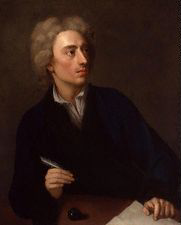When Queen Anne died, George I of
Hanover became King, thus a new dynasty succeeded the Stuarts. This dynasty would
last (lasted) about two hundred years. Thus the so-called Augustan Age started.
The new King could not speak English
and preferred Germany to England, which made him very unpopular.
This was a period of political
stability and flourishing of the Arts. It was a materialist society in which
trades were (considered) very important. Its
political institutions were hierarchical and hereditary: politicians based their power on bribing (corruption) rather than on an electoral basis.
political institutions were hierarchical and hereditary: politicians based their power on bribing (corruption) rather than on an electoral basis.
Merchants, craftsmen and individual
entrepreneurs were favoured by the government, which (on the other hand) did
not interfere with the private life of citizens.
The age of Enlightenment
It was a
period in which thinkers and philosophers gave a lot of importance to reason.
Man was placed at the centre of the Universe, so the pessimistic Puritan values
were rejected (refused).
Liberal thought (il pensiero liberale)
influenced the view of the world, affirming that free will could lead to
continuous progress and, in the end, to salvation for all humankind. It was
also an age of sexual permissiveness, though for men only. This faith (fede) in
progress led people to experiment, explore and invent as never before.
The features of Augustan literature and the
view of Nature
Literature
was interested in real life and social behavior, and politeness and the art of
conversation became more and more important.
The Arts
had to imitate Nature, which was seen as a masterpiece of balance and symmetry.
This symmetry extended not only to the Earth but to the whole Creation (all the
Creation), as the Universe was considered the manifestation of Divine
principles.
In Augustan
society virtue was considered very important as a benevolence towards oneself
and to others. Also, a new stress on (importance of) personal sensibility
appeared in literature which foreshadows (prefigura) one of the main trends of
Romanticism.
The Whigs and the Tories
The Whigs and the Tories were the
first political parties in Britain. The Tories supported the divine right of monarchy
and opposed religious toleration; the Clergy and the landowners sided with
them. The term ‘Tory’ became a synonym to ‘conservative’. The Whigs pressed for
commercial development, a vigorous foreign policy and religious toleration.
They were supported by the wealthy and commercial classes. They were in power
continuously for more than fifty years.
During the first Whig governments,
ministers started meeting without the King. At first, all ministers were equal,
but, as time went by, the figure of the Prime Minister emerged.
The first Prime Minister
The first Prime Minister was Robert
Walpole, who governed during the reigns of George I and George II. He promoted
liberal values by keeping England out of wars, so that trade could flourish and
taxes could be kept down. Cloth trading and mining were major industries in
this period, laying the basis for the Agrarian and Industrial Revolutions.
Wiliam Pitt
William Pitt, also a Whig, succeeded
Walpole in 1735. He started a mercantilistic policy to make England
economically competitive. This contributed to the creation of a new set of
middle-class values based on power, wealth and prestige.
English society in the 18th Century
The wealthy merchants, who supported Walpole
and Pitt in their policies, acquired more and more power and often bought large
estates to gain prestige and enable their children to marry into aristocracy.
Craftsman and artisans filled the gap between the upper class and the poor,
working for long hours for a low wage. The majority of the population (,
though,) remained extremely poor and lived in terrible conditions. Diseases
like smallpox and typhus affected these people and it has been estimated that
more than half of the children died before the age of five. The only
institutions that took care of the poor were the parishes, that hired many
children as apprentices. Many of them became chimney-sweepers. Parishes also
built workhouses for adults, but alcoholism and organized crime were frequent
problems at the time.
In the countryside, the enclosure
system caused the misery of many, who were forced to look for jobs in urban
areas, thus becoming the urban proletariat, but also favouring the development
of modern farming methods.
The coffee-houses
One of the most important features
of Augustan society were the coffee-houses, in which people met to share the
news and gossip (a function similar to that of theatres in the Elizabethan
Age). Fashionable people and artists attended the houses to exchange opinions.
It was mainly through the coffee-houses that the public opinion and journalism
began to evolve.

Nessun commento:
Posta un commento